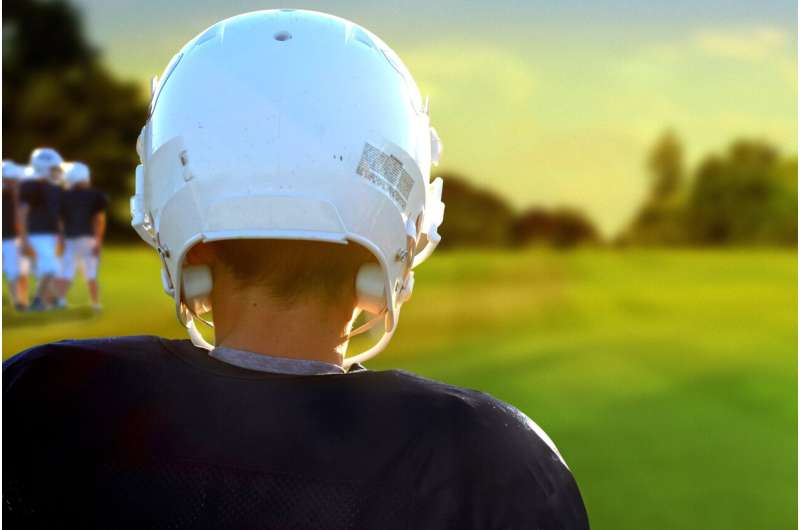This article has been reviewed according to Science X's editorial process and policies. Editors have highlighted the following attributes while ensuring the content's credibility:
fact-checked
trusted source
written by researcher(s)
proofread
Repeated concussions can alter heart activity and impact the 'heart-brain' axis

Mild traumatic brain injury or sport-related concussions occur frequently in contact sports such as football, rugby and ice hockey. A concussion doesn't just affect the brain; it results in stress to the entire body.
In our laboratory, comprised of exercise scientists and clinicians, we focus on studying heart function in patients with a concussion. After a concussion, there are increased demands on the body to maintain proper brain activity. To compensate for these demands, there are changes in heart function.
We have explored this interaction between the heart and the brain, known as the heart-brain axis, and have identified how heart function changes due to a concussion. For example, a hit to the head can send signals to the heart that shifts the body to a stressful "fight-or-flight" mode. This increases the stress on the body by causing a change in heart function.
This mechanism is related to what we would describe as a neuro-autonomic cardiovascular dysfunction. This means that problems with the autonomic nervous system (ANS) are causing altered signals going to the heart.
The ANS controls things that we don't actively think about, like breathing, digestion, and heart function. The ANS is also responsible for controlling the rhythm of a heartbeat.
Changes in systole following a concussion
Each heartbeat contains both a heart muscle contraction (systole) and relaxation (diastole) phase. That's why a blood pressure reading results in two numbers: the systolic and diastolic pressures. Systolic blood pressure, which is usually listed at the top of a blood pressure reading, is generated by the heart as it contracts, pushing out blood during each heartbeat.
Approximately 120 mmHg is a good systolic number, and the blood pressure varies with each heartbeat. These variations between heartbeats and systolic blood pressure are known as blood pressure variability, and it is a measure that provides information about stress on the body.
Concussions can also alter blood pressure. Since blood pressure can also be influenced by breathing, we controlled breathing rates in concussed athletes when conducting tests within five days of injury. We showed that blood pressure variability is suppressed during concussion.
Within five days after sustaining a concussion, systole—the phase of the heartbeat when the heart muscle contracts to allow blood to flow into the body—is impaired, with the heart contracting for a shorter period of time during each heartbeat. This has the potential to lower the efficiency with which blood is pumped from the heart.
Furthermore, there is elevated stress on the heart, causing it to squeeze harder to get blood into the body. These changes are typically transient and return to normal as concussion symptoms alleviate.
Long-term concussion symptoms
Concussion symptoms such as headache and pressure build-up in the head reflect the ANS not working correctly. These symptoms can last if the brain is injured. Research suggests that a history of repeated concussions can have long-lasting effects. Specifically, those with a history of at least three concussions show altered oxygen activity in the brain.
Each heartbeat provides blood and oxygen to the brain. Therefore, heart complications can result in altered brain activity. This is evident during strenuous activity such as repeated squat-stand maneuvers (10-second squat, then a 10-second stand, repeated 15 times), which can result in reduced brain oxygen in those with a history of concussion. This reduction in brain oxygen activity can be associated with elevated stress on the heart due to the concussion.
Similarly, in our lab, four women suffering from post-concussion syndrome (symptoms that last for months or even years after a concussion) presented with decreased systolic blood pressure variability. Monitoring heart function in patients with sustained concussion complications can aid with recovery.
In another case study, a male patient had a history of multiple concussions that elicited heart complications. Remarkably, treatment of the heart issues alleviated all concussion symptoms in a matter of days when the patient's cardiologist treated him with the heart medication amiodarone, which is used to treat heart rhythm problems.
Specifically, our case study presented a patient with almost 20 percent abnormal heartbeats, which is very unusual. The stress on the heart stresses the body, which can worsen the concussion symptoms. This is the first report of a patient in whom treatment of abnormal heartbeat cleared concussion symptoms.
There is still limited research about the heart-brain axis. For example, it is known that stress and anxiety are risk factors for heart disease. For concussion, a hit to the head can send signals to the heart, resulting in higher stress levels on the heart. As shown in our research, the higher stress levels on the heart can be measured by systolic blood pressure activity. More research is being done to better understand the heart-brain axis.
Future research and potential treatment options
Research is beginning to investigate how compounds from the cannabis plant, such as cannabidiol (CBD), may help concussion recovery. For example, four female patients between the ages of 42 and 52 suffering from post-concussion syndrome consumed CBD oil under guidance from their physician. This was followed by improvements in their systolic blood pressure variability. Furthermore, their concussion symptoms improved, leading to reduced perception of anxiety.
This led us to complete a literature review on the implications of cannabinoids, such as CBD, on concussion. Our findings suggest that cannabinoid therapy may have a beneficial effect on concussion recovery.
We have recently been funded by the National Football League/National Football League Players Association to study CBD's potential influence on brain-heart function and effect on concussion symptoms. This will enable us to better understand how these cannabinoids may influence the heart-brain axis relationship.
This article is republished from The Conversation under a Creative Commons license. Read the original article.![]()


















